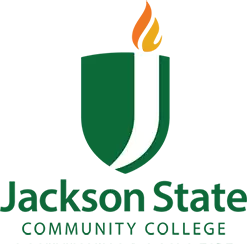Students who are successfully selected for the Radiologic Technology program will need to comply with the following requirements of the college and clinical hospitals prior to beginning fall classes and/or clinical education rotations:
Jackson State Community College:
-
Professional liability insurance: This insurance is available at a group rate and currently costs approximately $15.00 per year. This amount has been calculated into the fees required for the RADT 1315 – Introduction to Radiography course. Therefore, when tuition is paid, insurance will be in effect for the upcoming clinical rotations for a year.
-
Mantoux inoculation (Tuberculosis skin test): This test must be performed before students begin clinical observation/rotation and at various times throughout enrollment in the program. The test may be attained at a local state Health Department (not offered in Madison Co.) or primary care physician’s office. Clinical sites require 2 separate tests. Please remember tests must be checked in a specific time frame in order for results to be valid so schedule accordingly.
-
Hepatitis B vaccine: The following statement was issued by TBR as a result of a decision made by the TN Dept. of Health, “Effective July 1, 2011, unless exempted by law, any student enrolled in a higher education institution who is a health science student expected to have patient contact shall present proof of protection against hepatitis B before patient contact begins. For purposes of this paragraph adequate immunization is defined as:
-
A complete hepatitis B vaccine series: OR
-
Laboratory evidence of immunity or infection”.
The student is responsible for demonstrating compliance by documentation of 3 doses of hepatitis B vaccine or blood test (serology) showing immunity to hepatitis B virus (or infection).
-
MMR and Varicella (chickenpox) vaccines: As required by TBR and the TN Dept. of Health, all fulltime students must provide evidence of the immunity as follows:
-
MMR: Compliance may be demonstrated by:
-
Date of birth before 1957 OR
-
Documentation of 2 doses vaccine against measles, mumps, rubella OR
-
Documentation of blood test (serology) showing immunity to measles, mumps, rubella
-
-
Varicella (chickenpox): Compliance may be demonstrated by:
-
Date of birth before 1980 OR
-
History of chickenpox illness documented by a healthcare provider or verified by a physician, advanced practice nurse or physician assistant to whom the illness is described OR
-
Documentation of 2 doses of varicella vaccine OR
-
Documentation of blood test (serology) showing immunity to varicella
-
-
-
DTaP (tetanus vaccine): Must provide evidence of vaccine within the last 10 years.
***Students are responsible for all associated fees.***
Clinical Affiliate Hospitals:
Clinical affiliate facilities associated with our program have slightly different requirements for onboarding students. Because there will be rotations among various clinical locations, requirements have been standardized so students will be approved for all facilities. Program officials will make students aware of these requirements during the program admissions interview process and again during the Program Orientation session for accepted students conducted in July. The following items apply:
-
Drug Testing: Prior to participation in the clinical experience, students may be required to undergo drug/alcohol testing. Students will be responsible for the cost of drug/alcohol testing (approximately $38.75). Students are also subject to testing based on reasonable suspicion they are under the influence of drugs and/or alcohol while present at the college or clinical education centers. Testing for reasonable cause when the student is present at the college campus will follow the college procedure. Testing for reasonable cause when the student is present at the clinical affiliate will follow the affiliate’s procedure for employees. A student’s refusal to submit to testing or a positive result of the test may affect their eligibility to participate in a classroom or clinical experience, resulting in their inability to complete a course and/or the program and may also result in disciplinary action up to and including dismissal from Jackson State Community College.
-
Criminal Background Checks: Students enrolled in the Radiologic Technology program may be required to submit to a criminal background check in order to satisfy the guidelines of the clinical affiliate hospitals. Students will be responsible for the cost of this required background check (approximately $29.50). Based on the results of the background check, clinical affiliates have the right to not allow a student to participate in educational activities at that facility. This could result in the student’s inability to complete a course and the program
-
Physical Exams: Students enrolled in the Radiologic Technology program may be required to have a physical exam conducted by their primary health care provider or other approved practitioner. A signed letter acknowledging the students’ ability to meet the technical standards of the program will be submitted to program officials at the designated time. Students are responsible for any associated fee.
- COVID Vaccination: Students will adhere to the clinical affiliate policy for COVID vaccination. At present, there are exemptions provided for religious and/or medical exemptions at all locations with the exception of Baptist Memorial Hospital - Union City, TN.
-
Influenza Vaccination: Students enrolled in the Radiologic Technology program may be required to provide evidence of a current influenza vaccination or sign a waiver of refusal. Students are responsible for any associated fee.
-
CPR certification: All students will be responsible for earning certification in CPR and maintaining it throughout the program. Currently these classes are provided at no cost to students at an affiliate hospital and will be scheduled at appropriate times by program officials. Students are responsible for the cost of the card (approximately $10).

